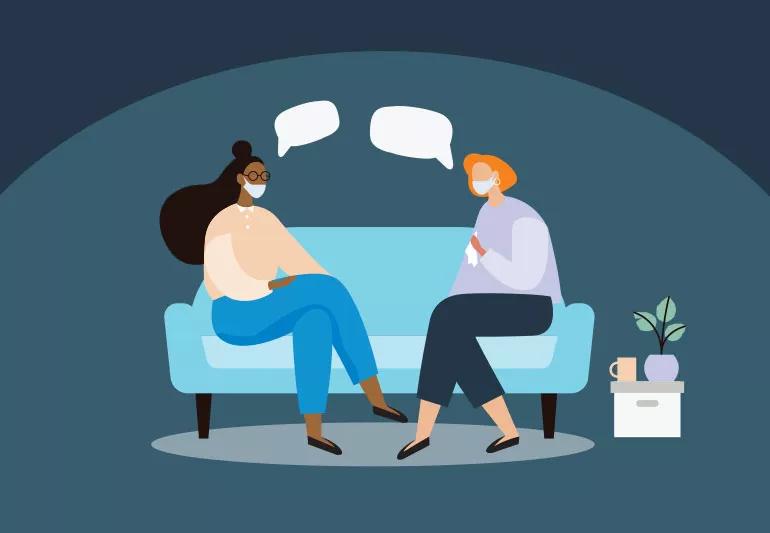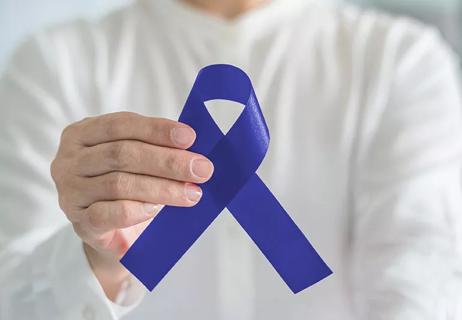Share your diagnosis with an inner circle of family and friends you can rely on

How do you tell those closest to you that you’ve received a life-altering Huntington’s disease diagnosis? Let’s start with this truth: It’s not an easy discussion, but it’s one that eventually needs to take place.
Advertisement
Cleveland Clinic is a non-profit academic medical center. Advertising on our site helps support our mission. We do not endorse non-Cleveland Clinic products or services. Policy
The genetic disease affecting your nervous system has no cure, after all. Symptoms typically develop slowly and grow progressively worse. The disease will leave its imprint on your body, mind and emotions.
These are unavoidable realities to life with Huntington’s. As time moves on, support from others will be important.
So talking about the diagnosis with family and friends — and developing a long-term plan — is essential. To start the discussion, we turn to movement disorder specialist Adam Margolius, MD, and clinical health psychologist Taylor Rush, PhD.
Before you start making a mental notification list, step back for a moment. After you get a Huntington’s diagnosis, you don’t have to tell anybody right away — especially if you don’t have any symptoms yet, says Dr. Rush.
Given that Huntington’s is genetic, many people get tested for the disease early and long before the onset of any symptoms. The first signs of Huntington’s typically appear between the ages of 30 and 50.
“You may want to take some time to yourself to get a better handle on it and understand it,” says Dr. Rush. “There is no pressure to immediately share the information. Wait until you feel ready.”
And when that time comes, start by sharing your diagnosis with those you can count on for current and future support.
Advertisement
“It’s a small circle you’re looking at,” says Dr. Margolius. “We’re talking about your spouse or partner, your children and other close family and friends. The sort of people who will be in your life 10 or 20 years in the future.”
Symptoms of Huntington’s often advance slowly, with changes coming over years instead of weeks or months. People with Huntington’s typically continue with their everyday activities through the early stage of the disease.
But at some point, physical and mental changes begin to become more noticeable. Balance may worsen, for instance. Slurred words may start popping up in conversations. Memory lapses may become more common.
That’s when it’s especially important to have those closest to you aware of your diagnosis.
“Those immediately around a person with Huntington’s often notice symptoms increasing before the person with Huntington’s,” says Dr. Margolius. “It helps to have another observer that can realize changes are happening and look for ways to help.”
Because there is help available. While there isn’t a cure for Huntington’s, there are medications that can treat symptoms such as uncontrollable movements (chorea), anxiety and depression.
Talking about your diagnosis also can open doors to:
The slow progression of Huntington’s provides time to get organized and prepare for the middle and end stages of the disease. “It’s a good idea to have conversations about what you want so everyone’s on the same page,” says Dr. Rush.
A to-do list could include:
If you have Huntington’s, there’s a 50% chance your child can inherit the disease. That can complicate plans to conceive.
“Many parents want to make sure the Huntington’s gene stops with them,” says Dr. Margolius.
A Huntington’s diagnosis can lead prospective parents toward the option of in vitro fertilization, where embryos can be tested for the disease. This can help ensure implanted embryos are negative for Huntington’s.
Advertisement
Families with Huntington’s in their bloodlines often have a deep understanding of the disease, which is passed down from generation to generation. That often limits the need to explain to relatives what a positive diagnosis means.
Others in your life, however, may have absolutely no idea what Huntington’s is, says Dr. Rush. She recommends keeping explanations basic to this group. Avoid overloading them with information.
“Keep it to the simple facts,” suggests Dr. Rush. “Tell them, ‘I found out I have a genetic disorder that will eventually affect every part of my life. I’m OK right now, but it’s a disease that progresses.’”
Don’t be surprised if those closest to you need time to absorb the news. They may have questions. Answer them directly. Point them toward educational resources, too, such as the Huntington’s Disease Society of America.
Conversations may eventually evolve toward the emotional and hands-on support you may need in the future and how they might fit in. (This becomes even more of a factor as symptoms develop.)
Be open and honest while keeping replies within your comfort level.
“Respond to them as best as possible. If it’s overwhelming for you to talk about, share that, too,” says Dr. Rush. “Emphasize that you’re still the same person, just with Huntington’s.”
Advertisement
Worries about sharing the news often accompany a Huntington’s diagnosis. “People ask, ‘How do I tell my spouse about this? How do I talk to my kids? Or my siblings?’ It’s a point of stress,” says Dr. Rush.
Which leads to maybe the most important piece of advice: Don’t avoid your own emotions.
“Knowing you have Huntington’s is a really difficult transition to make,” says Dr. Rush. “So feel what you feel, and it’s going to make it easier to navigate the experiences that come with sharing your diagnosis.”
Advertisement
Learn more about our editorial process.
Advertisement

Aerobic exercise paired with resistance training is good, but an individualized plan is best

Here’s what to know about employment when living with this condition

Ways to take care of your mental and physical health

An expert outlines everything you need to know

The neurological disease can make it hard for individuals to take care of themselves

Genetic markers can determine if you’ll develop Huntington’s disease or pass it on to your children

A correct prescription helps your eyes see clearly — but as natural changes occur, you may need stronger or different eyeglasses

Eating heart-healthy foods, moving around more and getting quality sleep are a few ways to get started

Wearing a scarf, adjusting your outdoor activities and following your asthma treatment plan can help limit breathing problems

Your diet in the weeks, days and hours ahead of your race can power you to the finish line

When someone guilt trips you, they’re using emotionally manipulative behavior to try to get you to act a certain way